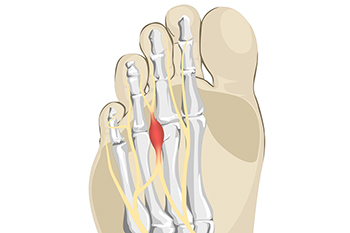Dallas Metro / North Texas
(214) 710-1028
High Heels and Morton’s Neuroma
Tuesday, 29 November 2022 00:00
Morton’s neuroma is a foot condition that can develop in women who frequently wear high heels. This condition can result from having inadequate room for the toes to move freely in and can cause the nerve between the third and fourth toes to become compressed. Irritation and inflammation may accompany this, which can cause severe pain and discomfort. Patients who have Morton’s neuroma often say the sensation they feel is similar to having a pebble or marble in the shoe, in addition to numbness and tingling. Mild relief may also be found when soft insoles are worn, the feet are elevated, and shoes that are worn have a wide toe area. Existing medical conditions may contribute to Morton’s neuroma. These can include flat feet, bunions, and hammertoes. If you feel you may have this foot condition, it is advised that you speak to a podiatrist who can properly treat this ailment.
Morton’s neuroma is a very uncomfortable condition to live with. If you think you have Morton’s neuroma, contact Kellvan Cheng, DPM of Elite Foot & Ankle. Our doctor will attend to all of your foot care needs and answer any of your related questions.
Morton’s Neuroma
Morton's neuroma is a painful foot condition that commonly affects the areas between the second and third or third and fourth toe, although other areas of the foot are also susceptible. Morton’s neuroma is caused by an inflamed nerve in the foot that is being squeezed and aggravated by surrounding bones.
What Increases the Chances of Having Morton’s Neuroma?
- Ill-fitting high heels or shoes that add pressure to the toe or foot
- Jogging, running or any sport that involves constant impact to the foot
- Flat feet, bunions, and any other foot deformities
Morton’s neuroma is a very treatable condition. Orthotics and shoe inserts can often be used to alleviate the pain on the forefront of the feet. In more severe cases, corticosteroids can also be prescribed. In order to figure out the best treatment for your neuroma, it’s recommended to seek the care of a podiatrist who can diagnose your condition and provide different treatment options.
If you have any questions, please feel free to contact our office located in Carrollton, TX . We offer the newest diagnostic and treatment technologies for all your foot care needs.




